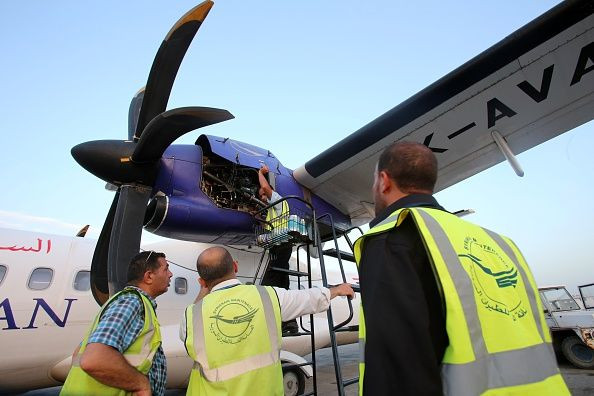Airport In Northern Syria Linked To Russian Military Buildup, Turkey Responds With Border Enforcement

Bulldozers rumble along a patch of vacant land in the town of Nusaybin, digging up large piles of thick mud. The construction of the trench-like holes is a part of the Turkish military’s effort to counter the buildup of a Syrian regime air base just across the border and to keep the civil war from seeping into the country.
The area across the border from Nusaybin in Qamishli, Syria, has been largely untouched by the Syrian civil war, which started in 2011, but is slowly becoming a hotspot of instability. Turkey faces two military campaigns near the city. Kurdish militant groups, according to the Turkish government, are sending weapons through Qamishli into Turkey to wage an offensive against its soldiers. An explosion Wednesday rocked the capital of Ankara, killing more than 28 people, most of them Turkish military personnel. In response, the military is lobbing mortars across the border. The U.S. State Department said Thursday it has continued to urge Turkey to stop the cross-border attacks and to “de-escalate” tensions.
The other military threat: the Syrian regime.
For years, President Bashar Assad’s troops have struggled to sustain themselves against the rebels and the Islamic State group, also known as ISIS. But earlier this year, when Russia launched its air campaign in the country, the Syrian regime began to make significant gains in the northern part of the country. Russia is not only bombing areas that help the regime gain ground, but sending weapons and supplies needed to aid the regime in its fight. The hub of those deliveries in the north: Qamishli.
Qamishli is under the control of Kurdish forces, but the main airport is operated by the Syrian regime. The regime shares it with Russia, which is dropping bombs throughout the country in support of Assad. As the regime and Russia fly supplies into the airport, the Turkish government deploys tankers and other military supplies to Nusaybin on the other side of the border.
#Turkey military is digging trenches in southeastern city Nusaybin on #Syria border across #Qamishli. @Cihan_Haber pic.twitter.com/bCnAb9MLsj
— Abdullah Bozkurt (@abdbozkurt) February 14, 2016
Qamishli is one of the last places in the region where Assad still controls sizable territory. It is also one of the most fraught battlegrounds for the regime because it is fighting several opposition factions, including those armed and supported by the U.S. and its anti-ISIS coalition.
Russia has vehemently denied claims it is utilizing the airport in Qamishli, but Kurdish officials confirmed the presence of Russian forces there last month. Flight radar shows Syria’s newest commercial airline, FlyDamas, flew its Boeing 737 to the Qamishli airport several times in the last three months.
“FlyDamas air traffic so far suggests much of its activity may not be entirely civilian in nature,” said Emanuele Ottolenghi of the Foundation for Defense of Democracies, a Washington think tank that is critical of American diplomacy with respect to Iran. “Its regular flights to Qamishli suggest the airline is providing support to the regime's military needs there.”
When the U.S. began arming Arab and Kurdish forces in the area, Assad and his allies — Iranian forces and the Lebanese military group Hezbollah — sought to counter the offensive by sending more ammunition and weapons to their troops on the ground. But given the proximity of regime forces to opposition factions, Assad couldn’t risk airdrops. Likewise, weapons could not be transported through other border crossings that were manned by enemy combatants. A possible solution: fly it in.
Samer Al-Dehni, a native of Damascus, appears to be the owner of FlyDamas. He describes himself as the general manager in an online video and says the goal behind establishing the airline was to lend support to Syrian Air, which he said in the interview is FlyDamas’ “mother company.” Al-Dehni was formerly the commercial director at Cham Wings Airlines, whose chairman has been sanctioned by the U.S. Cham Wings Airlines and Syrian Air, which also is under U.S. sanctions, are also making frequent stopovers in Qamishli.
As FlyDamas, and the two other Syrian commercial airlines, continue to fly to Qamishli, the Syrian regime will only get stronger, Ottolenghi said.
The flights to Qamishli come as world leaders, including those from the U.S., Russia and Iran, try to implement what is being called a “cessation of hostilities.” The plan, proposed in Munich last week, would require all parties to stop attacking each other, but it will leave open the possibility of targeting the Islamic State group and the Nusra Front, the al Qaeda offshoot in the country. The halt to fighting was supposed to take place in tandem with the delivery of humanitarian aid.
Political parties involved in the Syrian conflict, including Russia and the U.S., are to meet in Geneva Saturday to try to come to an agreement on the official implementation of the cessation of hostilities and a long-term political solution to the conflict.
© Copyright IBTimes 2025. All rights reserved.





















